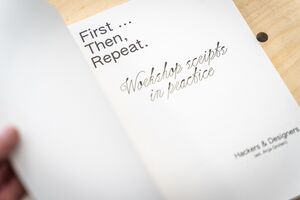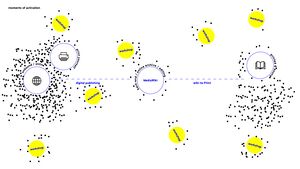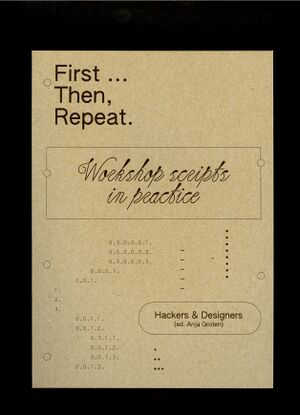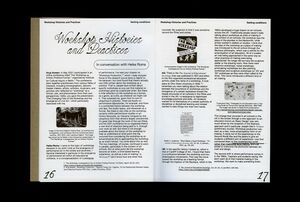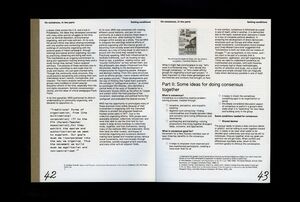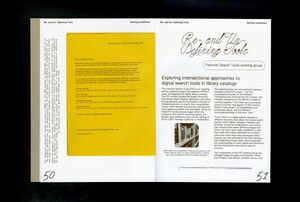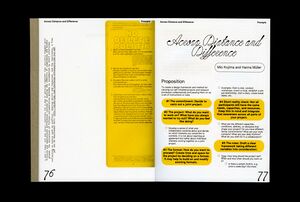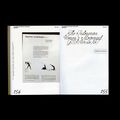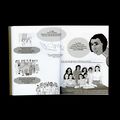Workshop scripts in practice
Workshop scripts in practice
Taken from Scripting Workshops and [1]] in First, Then, Repeat: Workshop Scripts in Practice
The workshop has become an attractive format for time-boxed collaboration that functions well within the context of the “new economy,” commercial conferences, incubator programs, and creative retreats. Taking place outside of the daily work routine, workshops ought to be fun while enhancing the participants’ CVs. At times the workshop is understood as a product in and of itself.
Ever since our first workshop-based event under the title “Hackers & Designers” in 2013, the workshop format has played an important role for the H&D collective. Since then, it has been reinterpreted in many ways. In contrast to the workshop paradigm described above, H&D workshops are not concerned with products or productivity, to speak in neo-liberal terms.
H&D has been exploring the BYOW (Bring Your Own Workshop) format as an attempt to decentralize the curation and organization of the workshop program, and to create from the get-go an egalitarian learning environment that responds to the particular assemblage of people, tools, and environments.
Part of that exploration has been the workshop script – a pedagogical document format that allows us to organize hybrid workshops in a distributed manner – across continents. The format of the “workshop script” evolved from a commitment toward paying critical attention to the workshop format as such and evolved further due to the necessity of staying connected throughout the COVID-19 pandemic. The workshop script became a “thing held in common,” a concept and artifact that was collectively shaped, and could be referred to while participants and facilitators were distributed across countries and timezones, while trying to continue to organize, facilitate, and participate in workshops remotely.
The publication First, Then... Repeat. Workshop Scripts in Practice is a cross-media publication (see: Cross-media publishing with MediaWiki) that draws together self-published and unpublished workshop scripts that evolved in and around the collective ecosystem of Hackers & Designers (H&D). The publication came together in 2022, but in some way was long in the making. It derives from an enthusiasm for the various ways collective learning environments take shape. It grew out of a curiosity for the ways that such practices are shared across different localities, timelines, and experiences.
Situated somewhere between documentation and a call for action, the workshop scripts are companions to self-organized learning situations. They articulate and materialize aspects of such practice that cannot always easily be explained through existing frameworks. Contributions to the book document and reflect on self-organized learning situations that spontaneously assemble practitioners from various domains, diffusing disciplinary boundaries and blurring distinctions between learner and teacher, user and maker, product and process, friendships and work relations. They have in common that they seek affiliations beyond predetermined domains and bring together various vocabularies and methods all at once.
This publication pays attention to the practice of (re)writing, (re)activating, documenting, and reflecting on “workshop scripts.” It is an attempt to discuss and show how workshops and workshop scripts shape—and in turn, are shaped by—the various environments they pass through. As a collection that holds various relational and iterative documents, it therefore cannot be considered a product or example of one specific kind of practice. The practices it draws together are site, context, and time specific, never complete, always ongoing, as are their various forms of expression.
To assist the reader, the contributions were organized into five clusters: Setting Conditions, Prompts, How-tos, Distributed Curricula, and Active Bibliographies. While the contributions are organized according to these clusters and appear in a linear order, they are also intertwined in multiple ways, and resist a linear narrative (forward-moving progressing, improving, innovating). Thus, readers are invited to be on the look out for other, multiple, and parallel connections and navigate the contributions idiosyncratically, non-linearly, in a zigzag, from back to front.
Find the publication online 🌐: firstthenrepeat.hackersanddesigners.nl. As an exploration into unusual, non-proprietary, open-source, free and libre publishing tools and workflows the code can be found on the H&D Github. The printed publication 📚 is available to order via the our website
Contributors
Åbäke, Julia Bee, Loes Bogers, Naomi Chambers, Qianxun Chen, Gerko Egert, Petra Eros, Feminist Health Care Research Group, Feminist Search Tools Working Group, fanfare, André Fincato, Gabriel Fontana, Sarah Garcin, Erin Gatz, Anja Groten, James Bryan Graves, Giselle Jhunjhnuwala, Olivia Jaques, Nienke Huitenga-Broeren, Angela Jerardi, Pernilla Manjula Philip, Brian Massumi, Katherine Moriwaki, Mio Kojima, Heerko van der Kooij, Siwar Kraytem, Juliette Lizotte, Karl Moubarak, Hanna Müller, Luke Murphy, Santiago Pinyol, Susan Ploetz, Juli Reinartz, Sandy Richter, Alice Strete, Social Muscle Club, Workshop Project, Stefanie Wuschitz, Xin Xin.
- Editor: Anja Groten
- Design: Anja Groten, Juliette Lizotte
- Development: Heerko van der Kooij, Maisa Imamović
- Copy-editing: Georgie Sinclair
- Proofreading: Loes Bogers
- Paper Inside: Rebello, 90 grs
- Paper Cover: Muskat Grijs, 290 grs
- Printing: Drukkerij RaddraaierSSP
- Binding: Swiss bound, with yellow open spine by AIGA Amsterdam
- Publisher: self-published by Hackers & Designers, www.hackersanddesigners.nl
- License: COLLECTIVE CONDITIONS FOR RE-USE (CC4r)
